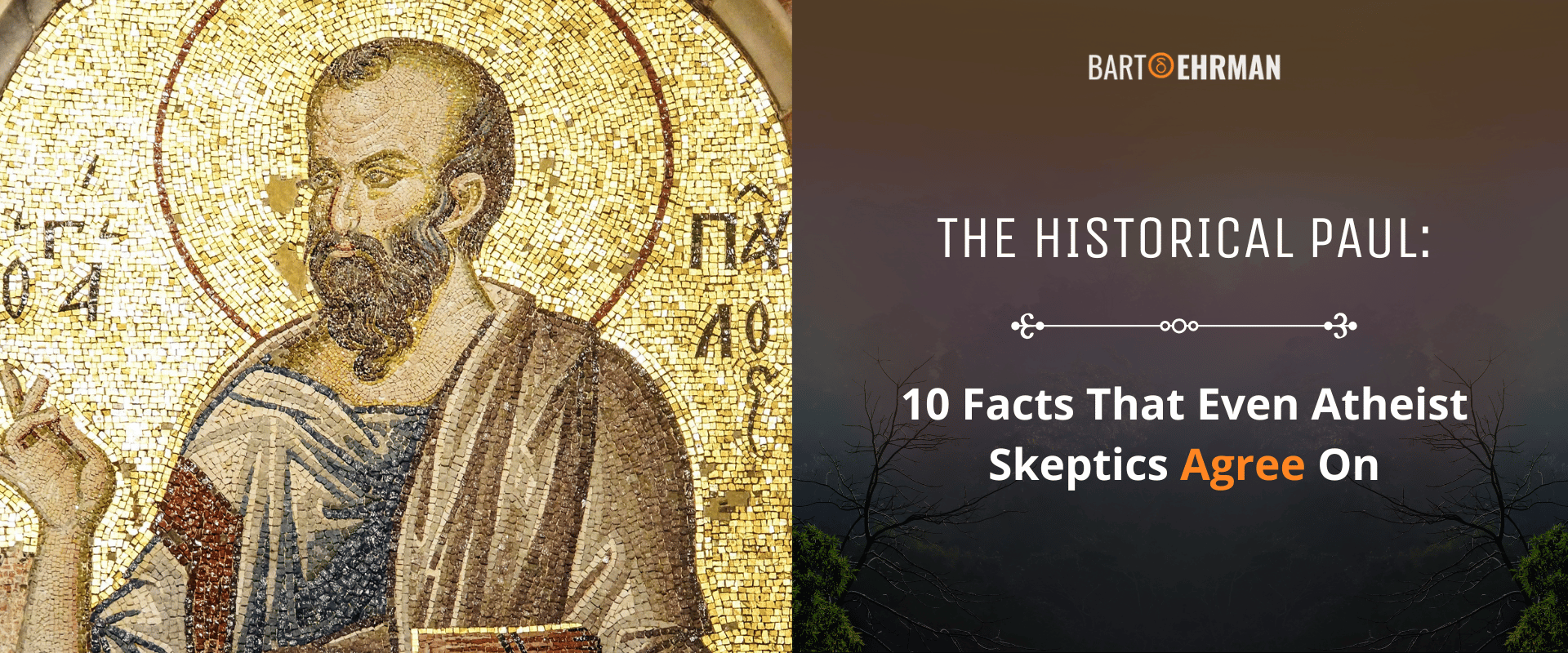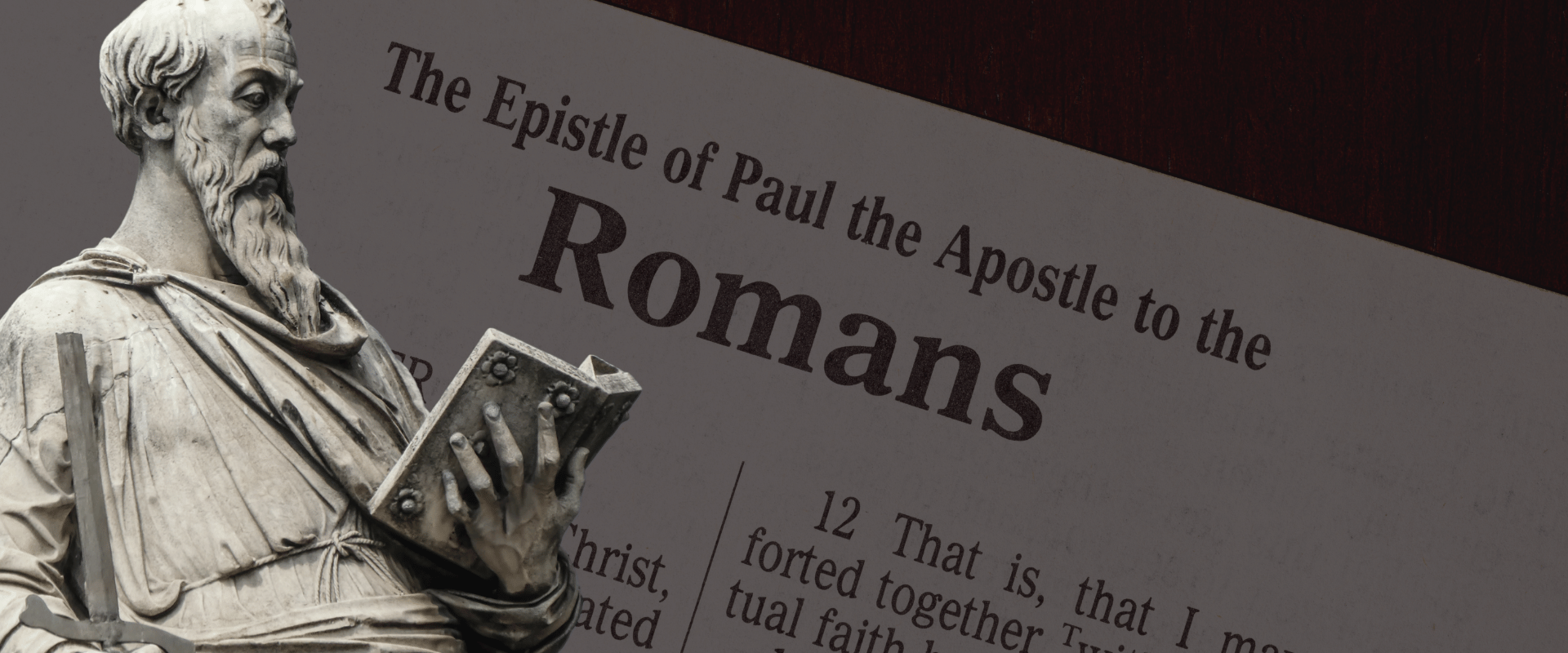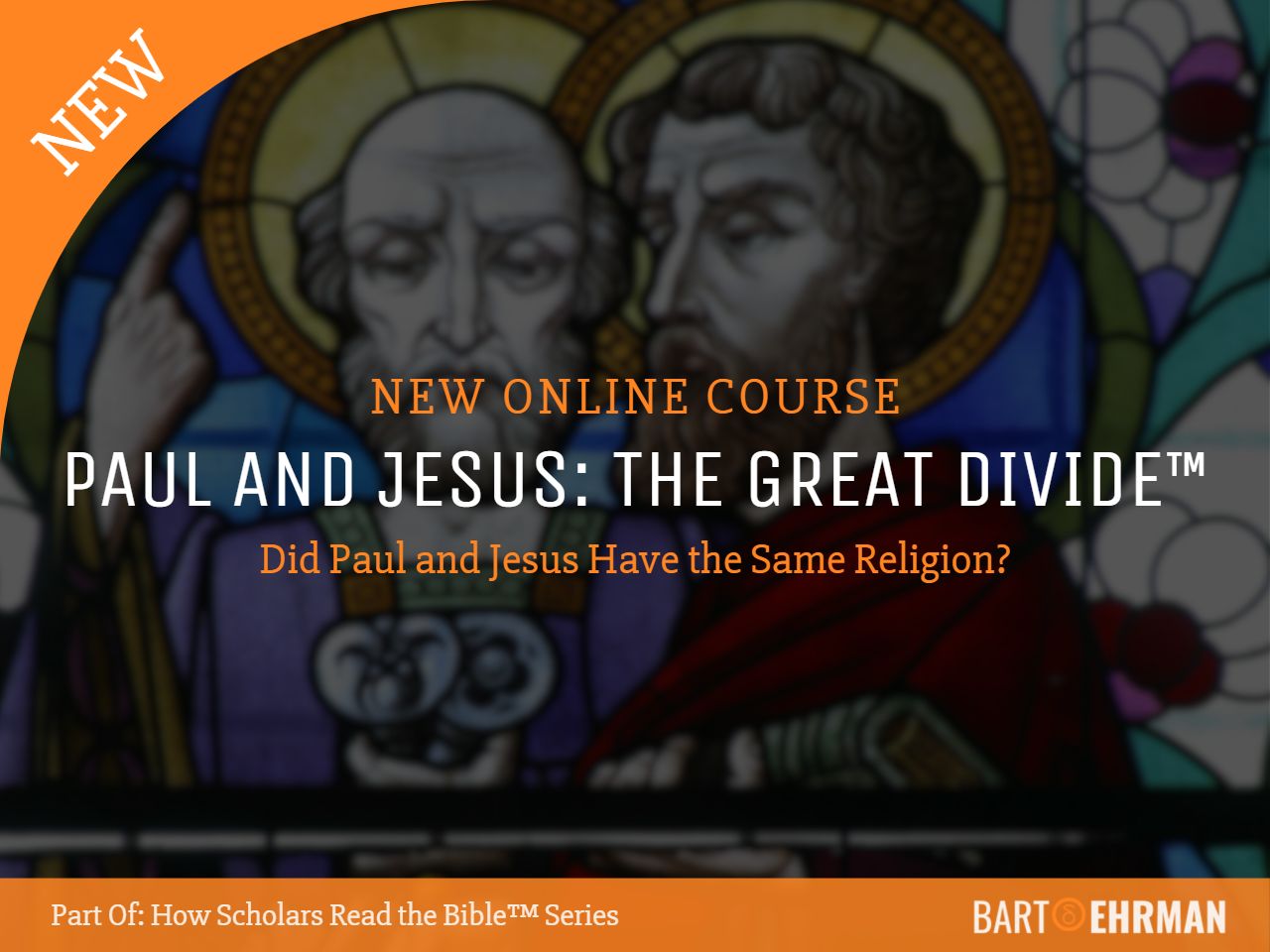The Historical Paul: 10 Facts That Even Atheist Skeptics Agree On

Written by Joshua Schachterle, Ph.D
Author | Professor | Scholar
Author | Professor | BE Contributor
Verified! See our editorial guidelines
Verified! See our guidelines
Date written: March 29th, 2025
Disclaimer: The views and opinions expressed in this article belong to the author and do not necessarily match my own. - Dr. Bart D. Ehrman
The historical Paul, as an apostle and one of the most influential figures in early Christianity, remains a subject of both reverence and intrigue. From his transformation from a fierce persecutor of Christians to a passionate proponent of Christ, Paul’s life is marked by significant personal and theological developments. His letters, which form a cornerstone of Christian doctrine, offer us a glimpse into his beliefs, struggles, and experiences. In this article, I’ll explore 10 fascinating facts about the historical Paul the Apostle.
Before I begin, though, I want to establish the parameters of the sources I’ll use for this article. James Tabor notes that for the vast majority of scholars, some biblical sources about the historical Paul are better than others. Tabor writes that scholars generally agree the most reliable sources are Paul’s own undisputed letters: 1 Thessalonians, Galatians, 1 and 2 Corinthians, Romans, Philippians, and Philemon. It is best, then, to use these authentic letters as sources about Paul in the Bible. This excludes the book of Acts, written long after Paul’s death, as well as disputed letters written in Paul’s name. Fortunately, however, there is plenty of information in the undisputed letters if you read carefully.

#1 – Paul was proud to be Jewish
In Philippians 3, Paul argues against a group of Christian teachers who have a different version of the gospel. In order to establish that his authority as an apostle is just as valid as that of the other teachers, he speaks of his own Jewish identity, for which he provides evidence in Philippians 3:4-6:
If anyone else has reason to be confident in the flesh, I have more: [I was] circumcised on the eighth day, a member of the people of Israel, of the tribe of Benjamin, a Hebrew born of Hebrews; as to the law, a Pharisee…
He does a similar thing, once more against those he calls false teachers, in 2 Corinthians 11:22:
Are they Hebrews? So am I. Are they Israelites? So am I. Are they descendants of Abraham? So am I.
Far from rejecting his identity as a Jew, Paul is clearly proud of it and sees it as an essential part of his credibility as a teacher.
#2 – He initially persecuted Christians
In Galatians 1:13, Paul writes:
You have heard, no doubt, of my earlier life in Judaism. I was violently persecuting (Greek: ediōkon) the church of God and was trying to destroy it.
Among the well-known facts about Paul the Apostle is that he was a persecutor of Christians. Unfortunately, Paul isn’t specific about what he did to the Church. The Greek verb he uses can mean pursuing or hunting (either animals or humans) but can also mean prosecuting in a legal sense.
The main point here, however, is that Paul says several times in his letters (see also Philippians 3:6 and 1 Corinthians 15:9) that he initially hated the Christian movement so much that he was attempting to destroy it.
#3 – The historical Paul believed he had seen the risen Jesus
Just a few years after the death of Jesus, Paul experienced some kind of vision in which he claimed to have seen him. This is one of the interesting facts about Paul the Apostle that appears several times in the Bible. Here’s what he says about it in Galatians 1:11-12:
For I want you to know, brothers and sisters, that the gospel that was proclaimed by me is not of human origin, for I did not receive it from a human source, nor was I taught it, but I received it through a revelation of Jesus Christ.
In 1 Corinthians 9:1, Paul makes it clear that this was a visual experience, asking his readers “Am I not free? Am I not an apostle? Have I not seen Jesus our Lord?” This experience drove Paul for the rest of his life to convince communities to whom he preached of what he believed he had received in this vision.
In addition, Paul wrote in 2 Corinthians 12:4 that this experience included auditory features in which he “was caught up into paradise and heard things that are not to be told, that no mortal is permitted to repeat.”
#4 – Paul had some kind of disability
In 2 Corinthians 12:7-9, Paul writes that his visions and revelations could easily have made him boastful had God not given him something to balance and humble him.
Therefore, to keep me from being too elated, a thorn was given me in the flesh, a messenger of Satan to torment me, to keep me from being too elated. Three times I appealed to the Lord about this, that it would leave me, but he said to me, “My grace is sufficient for you, for power is made perfect in weakness.”
Paul never explicitly says what this disability is. However, we do know that he came to see it as necessary.
#5 – Paul was not married
In 1 Corinthians 7, in answer to a question from the Corinthian communities about sexual practices, Paul writes that since it is hard for many people to remain entirely celibate, it is best to get married. However, in 1 Corinthians 7:8-9, he also writes about his own marital status as in this directive:
To the unmarried and the widows I say that it is good for them to remain unmarried as I am. But if they are not practicing self-control, they should marry. For it is better to marry than to be aflame with passion.
While he clearly does not condemn marriage in general, Paul himself is unmarried, at least during the time that he was writing these letters.
#6 – Paul had a disagreement with the original apostles
The first and second chapters of Galatians are Paul’s account of his past and his mission to his community in Galatia who are having doubts about his teachings. Apparently, other apostles have come in Paul’s absence and told the Galatians they must follow the Jewish Law, including being circumcised, in order to be part of the Jesus movement. Writing in the Anchor Bible Dictionary, H.D. Betz notes that Paul vehemently opposes this, telling the Galatians his story in order to show that his credibility is as good as that of the other apostles and even the original 12 apostles.
(Affiliate Disclaimer: We may earn commissions on products you purchase through this page at no additional cost to you. Thank you for supporting our site!)
In Galatians 2:11-14, Paul boasts that he stood up to Peter, whom he calls by his original Aramaic name, Cephas, when Peter had apparently acted uncharitably toward Gentiles.
But when Cephas came to Antioch, I opposed him to his face because he stood self-condemned, for until certain people came from James, he used to eat with the gentiles. But after they came, he drew back and kept himself separate for fear of the circumcision faction. And the other Jews joined him in this hypocrisy, so that even Barnabas was led astray by their hypocrisy. But when I saw that they were not acting consistently with the truth of the gospel, I said to Cephas before them all, “If you, though a Jew, live like a gentile and not like a Jew, how can you compel the gentiles to live like Jews?”
Of course, we only have Paul’s version of the incident here. We don’t know exactly what happened or what Peter’s response was. However, it is clear that Paul, a contentious person as evidenced by his letters, disagreed with some of the original 12 apostles.
#7- Paul went to Jerusalem only three times
Speaking of the original apostles, Paul tells the Galatians that he had only gone to visit the Jerusalem church after his visionary revelation, and that no one there knew him. The book of Acts, on the other hand, says he had studied as a young person in Jerusalem, but Paul never says this in his letters.
Instead, he says that three years after his revelation of Christ, he went to Jerusalem and stayed with Peter for 15 days. He also says he didn’t meet the rest of the 12 apostles, but did meet James, the brother of Jesus.
Fourteen years after his revelation, according to Galatians 2, Paul visited Jerusalem again, where he met the apostles of the Jerusalem church and presented his gospel for their approval. According to Paul, they approved of his mission to the Gentiles.
Paul’s third Jerusalem visit is not recorded in his letters beyond his intent. In Romans 15:25-33, Paul writes that he is about to go to Jerusalem to deliver a collection taken from the communities he founded to the apostles. It is probably during this trip that he was arrested and brought to Rome.
#8 – Paul claims to have performed miracles
One of the surprising facts about Paul the Apostle is that he claims to have done miraculous things. In 2 Corinthians 12:11-13, as Paul is defending his apostleship against other teachers, he validates his apostleship this way:
Indeed you [the Corinthians] should have been the ones commending me, for I am not at all inferior to these super-apostles, even though I am nothing. The signs of an apostle were performed among you with utmost patience, signs and wonders and mighty works.
Although Paul never tells us what these “signs and wonders” were, he claims some of the Corinthians witnessed them and that this confirms his apostolic status.

#9 – Paul supported himself through manual labor on his missionary journeys
In the earliest of Paul’s authentic letters, 1 Thessalonians, Paul writes to his beloved church in Thessaloniki that “You remember our labor and toil, brothers and sisters; we worked night and day so that we might not burden any of you while we proclaimed to you the gospel of God (1 Thes 2:9).” He makes other references to manual labor he did (1 Corinthians 4:12, 1 Corinthians 9:6, 12, 15) as well. He never explicitly says what kind of labor he performed, although Acts 18:3 claims he was a “tentmaker,” and this is certainly possible.
#10 – Paul was incarcerated in Rome in the early 60s CE
In Philippians 1:12-26, Paul writes that he is imprisoned. Many scholars believe he wrote this letter from Rome, although Ronald Hock writes in the HarperCollins Study Bible that he might also have been in Caesarea or Ephesus. This is what he says in verses 12-14:
I want you to know, brothers and sisters, that what has happened to me has actually resulted in the progress of the gospel, so that it has become known throughout the whole imperial guard and to everyone else that my imprisonment is for Christ, and most of the brothers and sisters, having been made confident in the Lord by my imprisonment, dare to speak the word with greater boldness and without fear.
The fact that Paul is interacting with the imperial guard (or praetorium, in the original writing), probably indicates that he was in Rome. Furthermore, Paul seems to indicate that his execution is a distinct possibility:
It is my eager expectation and hope that I will not be put to shame in any way but that by my speaking with all boldness Christ will be exalted now as always in my body, whether by life or by death. For to me, living is Christ and dying is gain.
Paul indicates here that whether he lives or dies, God’s purposes will be served. Most scholars believed he was executed in Rome around 64 CE.
Conclusion
If we use only the authentic, undisputed letters of Paul as source material, we have a lot of gaps in his life story. In addition, human memory is notoriously inaccurate, making it difficult to determine exactly what happened in the life of the historical Paul. However, his letters are certainly the best evidence we have for Paul’s biographical details. What do they tell us?
Paul was a proud, zealous Jew, a Pharisee, in fact. This zealousness was focused into hatred for the nascent Jesus movement, which he must have seen as heretical to the traditions of his people. However, after a visionary experience of Christ, Paul became just as zealous about Jesus, traveling vast areas and preaching the gospel he said he had received.
We can confidently say, from his letters, that he was unmarried, had some sort of disability, and supported himself by manual labor on his journeys. In addition, he had a disagreement with Peter and other apostles, believing himself to be just as much an apostle as they were since he had experienced the risen Jesus.

